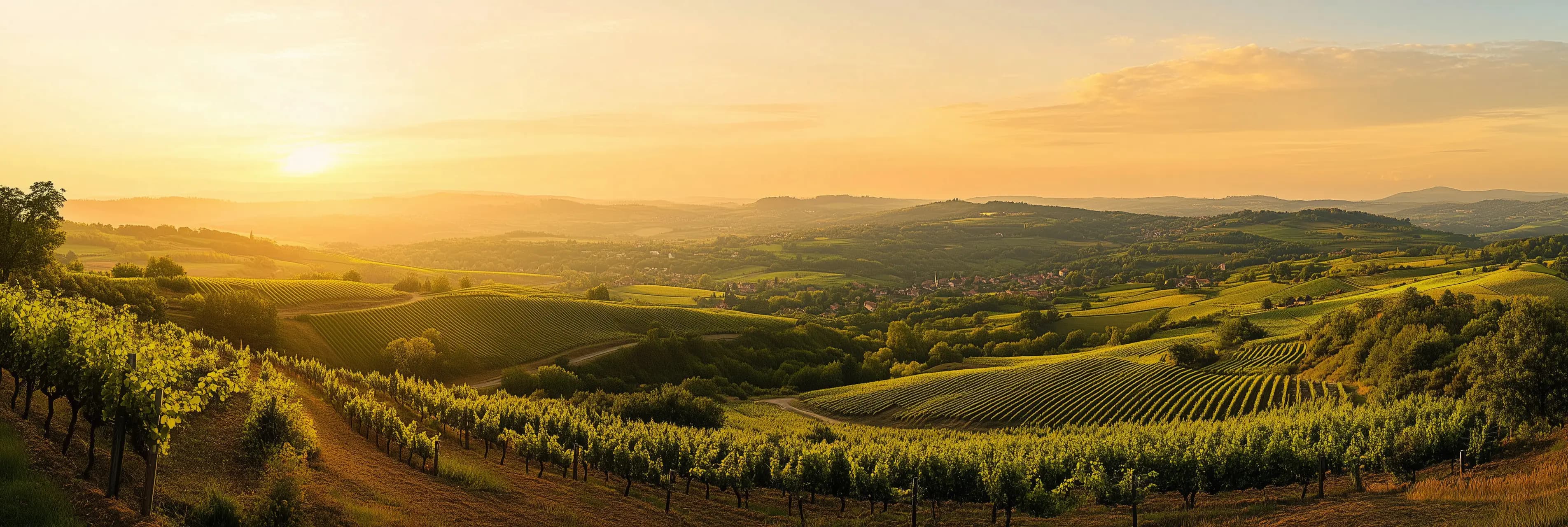The soul of Beaujolais: the fine line between AOC and Villages
Beaujolais is a fascinating wine region with a unique identity shaped by its terroir, traditions, and its emblematic Gamay grape. Yet, one question often confuses wine lovers: what is the difference between Beaujolais and Beaujolais Villages? While both wines come from the same region, they offer distinct experiences in terms of quality, flavor, and prestige. Let’s dive into the key differences and help you navigate the world of Beaujolais wines with confidence.
What is Beaujolais AOC?
The Beaujolais Appellation d'Origine Contrôlée (AOC) refers to the broadest category of wines from the Beaujolais region. These wines are produced in the southern part of the region, which features gentler slopes and more fertile soils compared to the northern areas. Beaujolais AOC wines are typically lighter, fruit-forward, and easy to drink.
Here are some characteristics to keep in mind:
- Grape Variety: Gamay is the primary grape used, offering fruity, low-tannin profiles.
- Flavors: Expect notes of red fruits like strawberry, raspberry, and cherry, with a lively freshness.
- Aging Potential: These wines are best enjoyed young, typically within two years of production.
- Production Area: About 96 villages in the southern Beaujolais contribute to this category.
- Price Point: Beaujolais AOC wines are often more affordable and accessible, making them great for casual drinking.
What is Beaujolais Villages AOC?
Beaujolais Villages, on the other hand, is a step up in quality and complexity. These wines come from 38 designated villages located primarily in the northern, hillier parts of the region, where the terroir is more suited for producing richer, more structured wines.
Here’s what sets Beaujolais Villages apart:
- Grape Variety: Still predominantly Gamay, but grown in better-quality soils.
- Flavors: Compared to Beaujolais AOC, these wines offer deeper, more complex fruit flavors, with hints of spice, earth, and sometimes minerality.
- Aging Potential: Beaujolais Villages wines can age slightly longer, often up to 4-5 years, though they are also enjoyable when young.
- Production Area: The grapes for Beaujolais Villages come from more restricted, higher-quality zones, particularly in the northern parts.
- Price Point: These wines are generally a bit more expensive than Beaujolais AOC, reflecting their higher quality.
The terroir factor: why Beaujolais and Villages wines taste so different?
The terroir plays a significant role in differentiating Beaujolais from Beaujolais Villages.
The northern part of Beaujolais, where the Villages wines are produced, has more granite and schist in the soil, which contributes to the wines' greater complexity and structure.
In contrast, the southern areas where Beaujolais AOC wines are made have clay and limestone soils, which yield lighter, more approachable wines.
The hills and cooler climate in the north also favor slower ripening, allowing the grapes to develop more intense flavors and retain higher acidity. This makes Beaujolais Villages wines more suitable for pairing with richer foods, while Beaujolais AOC wines are often enjoyed on their own or with lighter fare.
Which should you choose?
Choosing between Beaujolais and Beaujolais Villages depends largely on the occasion and your personal taste preferences:
- For everyday drinking: Beaujolais AOC is an excellent choice for casual sipping, picnics, or pairing with simple dishes like charcuterie, roasted chicken, or soft cheeses.
- For more complexity: If you’re looking for something a bit more refined or structured, Beaujolais Villages offers a more complex profile, making it a better match for roasted meats, hearty stews, or even grilled vegetables.
- For aging potential: While both wines are meant to be enjoyed relatively young, Beaujolais Villages offers slightly more aging potential, especially if you choose a bottle from a particularly good vintage.
Whether you opt for a Beaujolais AOC or a Beaujolais Villages, both categories showcase the best of what this beloved French wine region has to offer. Beaujolais wines are versatile, approachable, and full of character, offering something for every occasion and palate. With this knowledge, you can confidently explore the nuances of each type and find the perfect bottle for your next meal or celebration.

